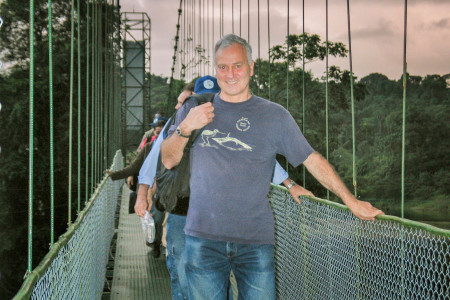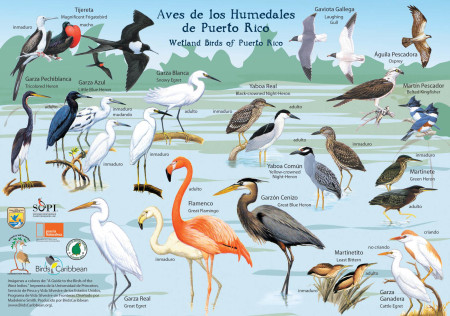
We continue our series of BirdsCaribbean member profiles with Herb Raffaele, former chief of the US Fish and Wildlife Service’s Division of International Conservation, and author of Birds of the West Indies and other books related to birds and conservation in the region. He received a lifetime achievement award from BirdsCaribbean and is currently a Director-at-Large for the organization. We interviewed him via email.
What is your job (currently and in the recent past if different from your current position)?
I retired two years ago from my position as Chief of the Division of International Conservation of the U.S. Fish and Wildlife Service. As division chief I managed a budget of over $20 million per year and hundreds of conservation projects around the world. Projects ranged from focusing on flagship species such as elephants, tigers, rhinos and the like, to regional and even global programs such as the Convention on Wetlands of International Importance. Prior to my 17 years as division chief I managed the Service’s conservation programs in Latin America and the Caribbean. In the 1970’s I served as a wildlife biologist for the Puerto Rican government and, for a number of years on the island, as the chief of wildlife planning for the island’s Department of Natural Resources.
How did you get interested in birds?
When I was a youth in the Boy Scouts, at the age of about 14, I needed a nature merit badge to become an Eagle Scout. I began to observe birds in order to obtain the badge, got hooked on watching them, and have done so ever since.
How did you get involved with BirdsCaribbean?
During the years that I served as the U.S. Fish and Wildlife Service’s regional program coordinator for Latin America and the Caribbean I was contacted by Jorge Moreno of Puerto Rico about facilitating a meeting of Caribbean islanders interested in bird conservation. The concept was highly appealing and so our program funded not only the first meeting of the various predecessor organizations to BirdsCaribbean, but virtually every meeting for close to three decades. Besides supporting meetings, we placed a major focus on supporting educational and outreach programs as well as very practical and effective projects such as the West Indian Whistling-Duck and Wetlands Conservation Project.
How has the organization influenced you?
The organization has enabled me to help promote bird conservation in the Caribbean and meet many outstanding people throughout the region with the same interests.
What does being a member of the board mean for you?
I see it as an important opportunity to help BirdsCaribbean become a more effective and fiscally sound organization so that its impact on conservation in the region will be significant and long-standing.
What do you think is the biggest challenge facing Caribbean bird conservation?
I believe that undoubtedly the biggest challenge to bird conservation is that birds and nature in general are not important components of the cultural values of the region. If local values, attitudes and beliefs are not positive towards nature, then it is inevitable that negative actions and behaviors will follow. Unfortunately, many conservation programs focus on the symptoms and not this underlying problem. Until this changes, conservation cannot succeed. And while I am on this subject, the solution is not simply education — the distribution of informational materials — it is more complicated than that. I am pleased that BirdsCaribbean has highlighted this critical point in its mission and has accomplished a great deal on this front through teacher training workshops, working with youth in communities to get them out in nature to appreciate birds through programs like BirdSleuth Caribbean, articles in the media, creation of the Caribbean Endemic Bird Festival and implementation of International Migratory Bird Day, among other activities.

What do you think are BirdsCaribbean’s best programs and why?
BirdsCaribbean has a number of excellent programs but those which excite me the most are the ones that get to the root of conserving birds – people’s values and the behaviors which derive from them. To that end, I think the Caribbean Endemic Bird Festival is particularly special. The islands of the Caribbean are extraordinary in that all the major ones have birds unique to them – birds which are found nowhere else in the world. At the same time, I expect that all too few island residents are aware of this special aspect of their heritage. The Endemic Bird Festival creates this awareness and builds pride – a key underpinning of true conservation. I am also very fond of the West Indian Whistling-Duck and Wetlands Project, an initiative primarily aimed at training teachers to incorporate wetlands conservation into their curricula for young children. This focus on reaching youth and providing them positive outdoor experiences in local wetlands is essential if they are to be concerned as adults for the environment around them.
If you could encourage people to do one thing for birds, what would it be?
Get others to appreciate birds and then take actions to conserve them so as to make their conservation a societal norm—actions which are accepted and respected by everyone.
What was your most rewarding education/conservation/research success?
I have had a lot, but undoubtedly my most rewarding conservation success relating to the Caribbean was publishing of A Guide to the Birds of West Indies. It took about 9 years of work in my spare time, but publication of this book, and its sequel, has facilitated countless people in the region being able to better learn about and enjoy their unique birdlife. There is nothing more satisfying than seeing a copy of the book that has been frazzled from years of use in the field since this shows how important the book has been to someone. Publication of the book has also enabled, through free use of the illustrations, many dozens of other bird conservation initiatives throughout the region including posters, bird identification cards, interpretive signs, and the creation of local island bird guides. This too has been a very gratifying development.

Great interview! Thanks for updating us and would love to hear what bird activities herb is doing in Cape Cod!
Nice to hear from you Richard!!! I know that Herb is working on a book and he’ll be helping us with a BirdsCaribbean birding field trip on May 7th to Plum Island.